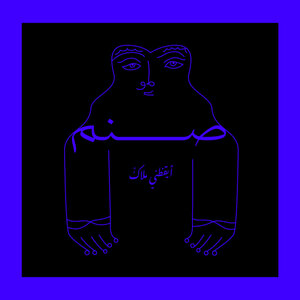SANAM: Aykathani Malakon (Mais Um)
Genre mashing Beirut outfit deliver outstanding debut set
Released Jul 6th, 2023 via Mais Um / By Norman Miller
 Beirut-based sextet Sanam have made a spine-tingling album fusing jazz, rock and post-punk with Middle Eastern influences – creating music where, in their own words, “Improvised rock, free jazz and noise underscore an exorcism of traditional Egyptian song and Arabic poetryâ€. If that sounds like it might be 'difficult listening' put any such notions aside, as this is a thrilling debut with not a dud moment across its nine tracks.
Beirut-based sextet Sanam have made a spine-tingling album fusing jazz, rock and post-punk with Middle Eastern influences – creating music where, in their own words, “Improvised rock, free jazz and noise underscore an exorcism of traditional Egyptian song and Arabic poetryâ€. If that sounds like it might be 'difficult listening' put any such notions aside, as this is a thrilling debut with not a dud moment across its nine tracks.Mixed by Jerusalem in My Heart mainman Radwan Ghazi Moumneh, the album's thrilling vitality reflects the decision to record live with no overdubs in a traditional village house in rural Lebanon. It was an experience wondrous vocalist Sandy Chamoun described as “almost hallucinogenic, as if there was a tacit agreement among us to produce an album that sounded 'unearthly' .â€
Backing Chamoun's Arabic vocals are Antonio El Hajj Moussa (bass, electronics), Anthony Sahyoun (guitar, synths, electronics), Pascal Semerdjian on drums, and Marwan Tohme (more guitars and electronics). The album also feature regional instruments – principally, Farah Kaddour on buzuq (a fretted string instrument traditionally associated with Levantine folk music). A potent thread of rock courses through many tracks to brilliant effect. Take the superb Ya Nass (O People), whose epic slow drum opening nods back to peak-period Led Zeppelin, via the John Bonham-esque When The Levee Breaks intro before it moves onto lithe guitar riffs Jimmy Page would be happy with, all overlaid with an eerie vocal line from Chamoun.
The heavy chords that mark the title track opener – named after a poem by modern Lebanese poet Bassem Hajjar – conjure unexpected echoes of a 70s Black Sabbath classic like War Pigs. Some of the weighty vibe running through the album springs from it being recorded during one of the most difficult periods in Lebanon's troubled recent history. Another contemporary Lebanese poem – Chamoun by Paul Chaoul – inspires Ayouha Al-Taiin Fi Al-Mawt (He Who Stabs Death), in which Chamoun's vocal progresses from quietly spoken intro to a state somewhere between desperation and ecstasy, set against a musical backing through which guitar licks poke through like aural blossoms.
You can apply a free rock tag to Oulo La Emmo (Tell His Mother), while the closing Rings is all jazzy looseness in its drum patters, spacey bass and guitars slowly twining round each other. There's a slow-burn fluidity too on the short-but-sweet Shajar Al-Touti (The Mulberry Trees), while Bell hooks you with strong bass and drum lines.
A superlative debut showcasing the diverse brilliance of the contemporary Arab music scene. 5/5





 All Content RSS Feed
All Content RSS Feed
Follow Bearded on...